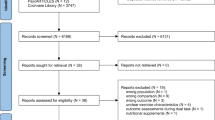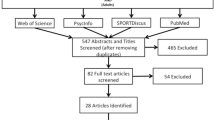Abstract
Background
Recent research has revealed a beneficial impact of chronic resistance exercise (RE) on brain function. However, it is unclear as to whether RE is also effective in an acute setting.
Objective
To investigate the immediate effects of a single RE session on cognitive performance in healthy adults.
Methods
A multilevel meta-analysis with random effects meta-regression model was used to pool the standardized mean differences (SMD) between RE and no-exercise (NEX) as well as between RE and aerobic exercise (AE). In addition to global cognitive function, effects on reported sub-domains (inhibitory control, cognitive flexibility, working memory, attention) were examined.
Results
Twelve trials with fair methodological quality (PEDro scale) were identified. Compared to NEX, RE had a positive effect on global cognition (SMD: 0.56, 95% CI 0.22–0.90, p = 0.004), but was not superior to AE (SMD: − 0.10, 95% CI 0.01 to − 0.20, p = 0.06). Regarding cognitive sub-domains, RE, compared to NEX, improved inhibitory control (SMD: 0.73, 95% CI 0.21–1.26, p = 0.01) and cognitive flexibility (SMD: 0.36, 95% CI 0.17–0.55, p = 0.004). In contrast, working memory (SMD: 0.35, 95% CI − 0.05 to 0.75, p = 0.07) and attention (SMD: 0.79, 95% CI − 0.42 to 2.00, p = 0.16) remained unaffected. No significant differences in sub-domains were found between RE and AE (p > 0.05).
Conclusion
RE appears to be an appropriate method to immediately enhance cognitive function in healthy adults. Further studies clearly elucidating the impact of effect modifiers such as age, training intensity, or training duration are warranted.





Similar content being viewed by others
References
Löllgen H, Böckenhoff A, Knapp G. Physical activity and all-cause mortality: an updated meta-analysis with different intensity categories. Int J Sports Med. 2009;30:213–24.
Vaynman S, Gomez-Pinilla F. License to run: exercise impacts functional plasticity in the intact and injured central nervous system by using neurotrophins. Neurorehabil Neural Repair. 2016;19:283–95.
Thomas AG, Dennis A, Bandettini PA, et al. The effects of aerobic activity on brain structure. Front Psychol. 2012;3.
Liu PZ, Nusslock R. Exercise-mediated neurogenesis in the hippocampus via BDNF. Front Neurosci. 2018;12:450.
Kandola A, Hendrikse J, Lucassen PJ, et al. Aerobic exercise as a tool to improve hippocampal plasticity and function in humans: practical implications for mental health treatment. Front Hum Neurosci. 2016;10:373.
Howland JG, Wang YT. Chapter 8 Synaptic plasticity in learning and memory: stress effects in the hippocampus. Essence of memory. Amsterdam: Elsevier; 2008. p. 145–58.
Colcombe S, Kramer AF. Fitness effects on the cognitive function of older adults. Psychol Sci. 2016;14:125–30.
Smith PJ, Blumenthal JA, Hoffman BM, et al. Aerobic exercise and neurocognitive performance: a meta-analytic review of randomized controlled trials. Psychosom Med. 2010;72:239–52.
Hindin SB, Zelinski EM. Extended practice and aerobic exercise interventions benefit untrained cognitive outcomes in older adults: a meta-analysis. J Am Geriatr Soc. 2012;60:136–41.
McMorris T, Sproule J, Turner A, et al. Acute, intermediate intensity exercise, and speed and accuracy in working memory tasks: a meta-analytical comparison of effects. Physiol Behav. 2011;102:421–8.
Chang Y, Labban J, Gapin J, et al. The effects of acute exercise on cognitive performance: a meta-analysis. Brain Res. 2012;1453:87–101.
Ludyga S, Gerber M, Brand S, et al. Acute effects of moderate aerobic exercise on specific aspects of executive function in different age and fitness groups: a meta-analysis. Psychophysiology. 2016;53:1611–26.
Groot C, Hooghiemstra A, Raijmakers P, et al. The effect of physical activity on cognitive function in patients with dementia: a meta-analysis of randomized control trials. Ageing Res Rev. 2016;25:13–23.
Firth J, Stubbs B, Rosenbaum S, et al. Aerobic exercise improves cognitive functioning in people with schizophrenia: a systematic review and meta-analysis. Schizophr Bull. 2016;43:546–56.
Northey JM, Cherbuin N, Pumpa KL, et al. Exercise interventions for cognitive function in adults older than 50: a systematic review with meta-analysis. Br J Sports Med. 2018;52:154–60.
de Greeff JW, Bosker RJ, Oosterlaan J, et al. Effects of physical activity on executive functions, attention and academic performance in preadolescent children: a meta-analysis. J Sci Med Sport. 2018;21:501–7.
Song D, Yu DS, Li PW, et al. The effectiveness of physical exercise on cognitive and psychological outcomes in individuals with mild cognitive impairment: a systematic review and meta-analysis. Int J Nurs Stud. 2018;79:155–64.
van Uffelen JGZ, Chin Paw MJM, Hopman-Rock M, et al. The effects of exercise on cognition in older adults with and without cognitive decline: a systematic review. Clin J Sport Med. 2008;18:486–500.
Snowden M, Steinman L, Mochan K, et al. Effect of exercise on cognitive performance in community-dwelling older adults: review of intervention trials and recommendations for public health practice and research. J Am Geriatr Soc. 2011;59:704–16.
Loprinzi PD, Frith E, Edwards MK. Resistance exercise and episodic memory function: a systematic review. Clin Physiol Funct Imaging. 2018;8:e76301.
Sáez de Asteasu ML, Martínez-Velilla N, Zambom-Ferraresi F, et al. Role of physical exercise on cognitive function in healthy older adults: a systematic review of randomized clinical trials. Ageing Res Rev. 2017;37:117–34.
Kelly ME, Loughrey D, Lawlor BA, et al. The impact of exercise on the cognitive functioning of healthy older adults: a systematic review and meta-analysis. Ageing Res Rev. 2014;16:12–31.
Sibley BA, Etnier JL. The relationship between physical activity and cognition in children: a meta-analysis. Pediatr Exerc Sci. 2003;15:243–56.
Moher D, Liberati A, Tetzlaff J, et al. Preferred reporting items for systematic reviews and meta-analyses: the PRISMA statement. BMJ. 2009;339:b2535.
Wager E, Wiffen PJ. Ethical issues in preparing and publishing systematic reviews. J Evid Based Med. 2011;4:130–4.
Wilke J, Krause F, Vogt L, et al. What is evidence-based about myofascial chains: a systematic review. Arch Phys Med Rehabil. 2016;97:454–61.
Krause F, Wilke J, Vogt L, et al. Intermuscular force transmission along myofascial chains: a systematic review. J Anat. 2016;228:910–8.
Horsley T, Dingwall O, Sampson M. Checking reference lists to find additional studies for systematic reviews. Cochrane Database Syst Rev. 2011;73:505.
Maher CG, Sherrington C, Herbert RD, et al. Reliability of the PEDro scale for rating quality of randomized controlled trials. Phys Ther. 2003;83:713–21.
Foley CF, Bhogal SK, Teasell RW, et al. Estimates of quality and reliability with the physiotherapy evidence-based database scale to assess the methodology of randomized controlled trials of pharmacological and nonpharmacological interventions. Phys Ther. 2006;86(6):817–24.
de Morton NA. The PEDro scale is a valid measure of the methodological quality of clinical trials: a demographic study. Aust J Physiother. 2009;55:129–33.
Rosenthal R. Meta-analytic procedures for social research. Newbury Park: Sage Publications; 1993.
Curtin F, Altman DG, Elbourne D. Meta-analysis combining parallel and cross-over clinical trials I: continuous outcomes. Stat Med. 2002;21:2131–44.
Hedges LV, Tipton E, Johnson MC. Robust variance estimation in meta-regression with dependent effect size estimates. Res Synth Methods. 2010;1:39–65.
Fisher Z, Tipton E. Robumeta. an r package for robust variance estimation in meta-analysis. https://arxiv.org/abs/1503.02220.
Radford JA, Burns J, Buchbinder R, et al. Does stretching increase ankle dorsiflexion range of motion? A systematic review. Br J Sports Med. 2006;40:870–5.
Chang Y, Etnier JL. Effects of an acute bout of localized resistance exercise on cognitive performance in middle-aged adults: a randomized controlled trial study. Psychol Sport Exerc. 2009;10:19–24.
Chang Y, Etnier JL. Exploring the dose-response relationship between resistance exercise intensity and cognitive function. J Sport Exerc Psychol. 2009;31:640–56.
Pontifex MB, Hillman CH, Fernhall BO, et al. The effect of acute aerobic and resistance exercise on working memory. Med Sci Sports Exerc. 2009;41:927–34.
Alves CRR, Gualano B, Takao PP, et al. Effects of acute physical exercise on executive functions: a comparison between aerobic and strength exercise. J Sport Exerc Psychol. 2012;34(4):539–49.
Chang Y, Ku P, Tomporowski PD, et al. Effects of acute resistance exercise on late-middle-age adults’ goal planning. Med Sci Sports Exerc. 2012;44:1773–9.
Chang Y, Tsai C, Huang C, et al. Effects of acute resistance exercise on cognition in late middle-aged adults: general or specific cognitive improvement? J Sci Med Sport. 2014;17:51–5.
Tsai C, Wang C, Pan C, et al. Executive function and endocrinological responses to acute resistance exercise. Front Behav Neurosci. 2014;8:283.
Hsieh S, Chang Y, Hung T, et al. The effects of acute resistance exercise on young and older males’ working memory. Psychol Sport Exerc. 2016;22:286–93.
Johnson L, Addamo PK, Selva Raj I, et al. An acute bout of exercise improves the cognitive performance of older adults. J Aging Phys Act. 2016;24:591–8.
Chang H, Kim K, Jung Y, et al. Effects of acute high-intensity resistance exercise on cognitive function and oxygenation in prefrontal cortex. J Exerc Nutr Biochem. 2017;21(2):1–8.
Dunsky A, Abu-Rukun M, Tsuk S, et al. The effects of a resistance vs an aerobic single session on attention and executive functioning in adults. PLoS One. 2017;12(4):0176092.
Tsukamoto H, Suga T, Takenaka S, et al. An acute bout of localized resistance exercise can rapidly improve inhibitory control. PLoS One. 2017;12(9):e0184075.
Querido JS, Sheel AW. Regulation of cerebral blood flow during exercise. Sports Med. 2007;37(9):765–82.
Ogoh S, Ainslie PN. Cerebral blood flow during exercise: mechanisms of regulation. J Appl Physiol. 2009;107(5):1370–80.
Yarrow JF, White LJ, McCoy SC, et al. Training augments resistance exercise induced elevation of circulating brain derived neurotrophic factor (BDNF). Neurosci Lett. 2010;479:161–5.
Tsai C, Wang C, Pan C, et al. The effects of long-term resistance exercise on the relationship between neurocognitive performance and GH, IGF-1, and homocysteine levels in the elderly. Front Behav Neurosci. 2015;9:471.
Nieto-Estévez V, Defterali Ç, Vicario-Abejón C. IGF-I: a key growth factor that regulates neurogenesis and synaptogenesis from embryonic to adult stages of the brain. Front Neurosci. 2016;10:2896.
Best JR, Chiu BK, Liang Hsu C, et al. Long-term effects of resistance exercise training on cognition and brain volume in older women: results from a randomized controlled trial. J Int Neuropsychol Soc. 2015;21:745–56.
Grooms D, Appelbaum G, Onate J. Neuroplasticity following anterior cruciate ligament injury: a framework for visual-motor training approaches in rehabilitation. J Orthop Sports Phys Ther. 2015;45:381–93.
Wilkerson GB. Neurocognitive reaction time predicts lower extremity sprains and strains. Int J Athl Ther Train. 2012;17:4–9.
Huijgen BCH, Leemhuis S, Kok NM, et al. Cognitive functions in elite and sub-elite youth soccer players aged 13–17 years. PLoS One. 2015;10:e0144580.
Author information
Authors and Affiliations
Corresponding author
Ethics declarations
Funding
No sources of funding were used to assist in the preparation of this article.
Conflict of interest
Jan Wilke, Florian Giesche, Kristina Klier, Lutz Vogt, Eva Herrmann, and Winfried Banzer declare that they have no conflicts of interest relevant to the content of this review.
Rights and permissions
About this article
Cite this article
Wilke, J., Giesche, F., Klier, K. et al. Acute Effects of Resistance Exercise on Cognitive Function in Healthy Adults: A Systematic Review with Multilevel Meta-Analysis. Sports Med 49, 905–916 (2019). https://doi.org/10.1007/s40279-019-01085-x
Published:
Issue Date:
DOI: https://doi.org/10.1007/s40279-019-01085-x




